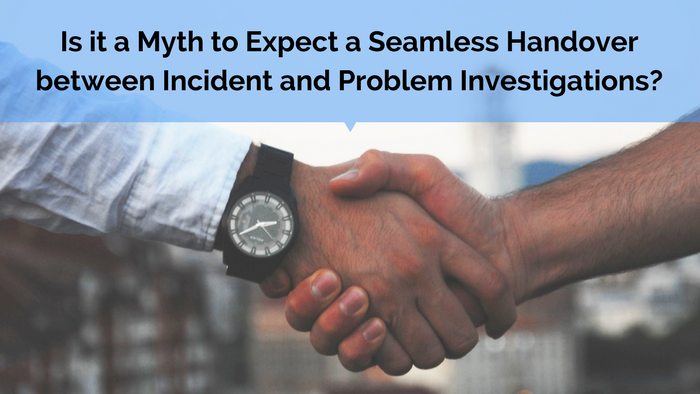Is it a myth to expect a seamless handover between Incident and Problem Investigations?
By Mat-thys Fourie on Oct 30, 2017 10:14:00 PM
Rapid Incident Restoration within 5 Questions
By Mat-thys Fourie on Aug 9, 2017 10:15:00 PM
How to identify the reason an incident occurred by asking just 5 questions? (And these are not the 5 WHYs...)
Our approach is surprisingly simple, single-minded and focused. Every action is based on finding the CORRECTFAULT! Almost every time when our consultants get involved with a Bridge Team trying to restore an action, we find them floundering to identify the correct fault. All we do differently to what has been tried before is ask searing questions of the SMEs that focus on the fault.
Who Has the Information in Incident Investigation?
By Mat-thys Fourie on Apr 26, 2016 10:30:00 PM
Simple Question, But Powerful!
One of the most important questions to ask yourself in attempting to solve an incident quickly, accurately and permanently is to ask the following three questions:
- What do you know about the incident?
- What don’t you know about the incident?
- How can you collaborate with whom that could provide you with this missing information?
Mean Time to Restore Service - Improve your MTR by 50-60%
By Mat-thys Fourie on Jun 18, 2015 2:42:00 AM
The key lies in asking the right interrogative questions to the right people in order to identify the correct restoration criteria for a quick and accurate restoration. It is easier than you think when you follow a process that can be used in any type of incident. It is all about three components namely; OBJECT, FAULT and UNIQUENESS of the fault.
Developing a Useful Hypothesis:
By Mat-thys Fourie on Apr 1, 2015 4:48:00 PM
The Acid Test for Finding Effective Root Causes
If you cannot develop a useful hypothesis for a specific problem situation, you do not have a worthwhile cause to be considered. A hypothesis in itself is a test of your ability to link a cause to that of the incident/fault experienced.







